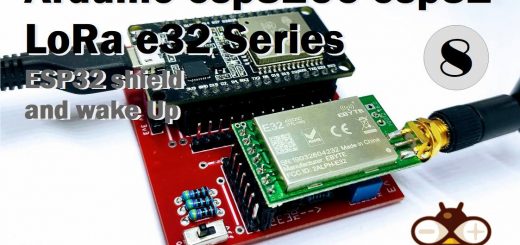Home › Forums › The libraries hosted on the site › EByte LoRa e32 UART devices sx1262/sx1268 › Arduino iot 33 & AS32-TTL-100
Tagged: adapt library, AS32-TTL-100
- This topic has 6 replies, 3 voices, and was last updated 2 years, 10 months ago by
Renzo Mischianti.
-
AuthorPosts
-
-
17 March 2021 at 21:12 #10928
Hello.
I would like to connect an Arduino IoT with AS32-TTL-100 but there are no drivers. It works partially with driver for LORA E32 on this page. I really don’t know if this driver can be used or I connected the hw incorrectly. The manual does not describe the use of PullUP & Voltage divider resistors, but it doesn’t matter if they are there or not, it does not work. IoT does not have SoftwareSerial or HardwareSerial I used Serial1. Can anyone advise me how to do this?
well thank you
Exit the program: Sleep mode Reset= OK Info= AS32-TTL100-V2.0 Soft v.= 32T20-O32M-V4.01 Handsh= OK Napatie= 3.19Volts Konf= 0xC0 ,0xFF ,0xFF ,0x1A ,0x8 ,0xC0 , RSSI a= ERROR RSSI g= ERROR ******* OK ******** RSSI aktu= ERROR RSSI glob= ERROR RSSI aktu= ERROR RSSI glob= ERROR RSSI aktu= ERROR RSSI glob= ERROR RSSI aktu= ERRORProgram :
/* Test na RSSI */ byte AUX_PIN = 2; byte M0_PIN = 3; byte M1_PIN = 4; enum MODE_TYPE { MODE_0_NORMAL = 0, MODE_1_WAKE_UP, MODE_2_POWER_SAVIN, MODE_3_SLEEP = 0xFF }; void setup() { Serial.begin(9600); Serial1.begin(9600); while (!Serial) { } delay(100); pinMode(7, OUTPUT); pinMode(6, OUTPUT); SwitchMode(MODE_3_SLEEP); triple_cmd(0xC3); // nazov, verzia Serial.print("Info= "); Module_info(1); triple_cmd(0xF3); // nazov, verzia Serial.print("Soft v.= "); Module_info(1); triple_cmd(0xE1); // nazov, verzia Serial.print("Handsh= "); Module_info(1); triple_cmd(0xC5); //VH a VL sú údaje o napätí. Napríklad modul vráti C5 0C 1C, prevedie 0C 1C na desatinné miesto a získa hodnotu 3100, čo naznačuje, žeprúdové napätie modulu je 3,1V. Serial.print("Napatie= "); Module_info(2); triple_cmd(0xC1); // Modul vráti súčasné konfiguračné parametre vhexadecimálny formát Serial.print("Konf= "); Module_info(3); sixple_cmd(0xAF, 0xAF, 0x73, 0x00, 0xAF, 0xF3); //aktualny Serial.print("RSSI a= "); Module_info(1); sixple_cmd(0xAF, 0xAF, 0x74, 0x00, 0xAF, 0xF4); //global Serial.print("RSSI g= "); Module_info(1); //SwitchMode(MODE_0_NORMAL); Serial.println("******* OK ********"); } void loop() { sixple_cmd(0xAF, 0xAF, 0x74, 0x00, 0xAF, 0xF4); //global Serial.print("RSSI g= "); Module_info(1); delay(500); } //—————————————————- void triple_cmd(byte Tcmd) { uint8_t CMD[3] = { Tcmd, Tcmd, Tcmd }; Serial1.write(CMD, 3); delay(50); //need ti check } void sixple_cmd(byte a, byte b, byte c, byte d, byte e, byte f) { uint8_t CMD[6] = { }; //globalny Serial1.write(CMD, 6); delay(50); //need ti check } void cleanUARTBuf() { bool IsNull = true; while (Serial1.available()) { Serial1.read(); } } void Module_info(int typeStr) { uint8_t Readcnt, idx; Readcnt = Serial1.available(); if (Readcnt > 0) { if (typeStr == 1) { String input = Serial1.readString(); Serial.print(input); } else if (typeStr == 2) { int inx = 0; byte incomingByte[2]; while (Serial1.available()) { incomingByte[inx++] = Serial1.read(); //Serial.print(", 0x");Serial.print(incomingByte[inx-1],HEX); } Serial.print( (float) ((incomingByte[1] << 8) | incomingByte[2]) / 1000); Serial.print("Volts"); Serial.println(); } else { while (Serial1.available()) { byte incoming = Serial1.read(); Serial.print("0x"); Serial.print(incoming, HEX); Serial.print(" ,"); } Serial.println(""); } } else { Serial.print(" nemam data "); cleanUARTBuf(); } } void SwitchMode(MODE_TYPE mode) { WaitAUX_H(); switch (mode) { case MODE_0_NORMAL: // Mode 0 | normal operation digitalWrite(M0_PIN, LOW); digitalWrite(M1_PIN, LOW); Serial.println("General working mode"); break; case MODE_1_WAKE_UP: digitalWrite(M0_PIN, HIGH); digitalWrite(M1_PIN, LOW); Serial.println("Wake up mode"); break; case MODE_2_POWER_SAVIN: digitalWrite(M0_PIN, LOW); digitalWrite(M1_PIN, HIGH); Serial.println("Power saving mode"); break; case MODE_3_SLEEP: // Mode 3 | Setting operation digitalWrite(M0_PIN, HIGH); digitalWrite(M1_PIN, HIGH); Serial.println("Sleep mode"); break; default: return; } WaitAUX_H(); delay(10); } void WaitAUX_H() { while ((digitalRead(AUX_PIN) == LOW)) { Serial.print("."); delay(100); } } -
18 March 2021 at 08:15 #10950
Hi makac,
It’s very difficult to debug without a device.
I try to ask to the Ashining some send me some devices to adapt the library.
Bye Renzo -
3 March 2023 at 08:46 #24567
This project is OK!.
-
3 March 2023 at 09:13 #24568
Hi Ungkoon,
do you mean that you tried the library with the AS32-TTL-100 and it works?
Thanks Renzo -
4 March 2023 at 00:01 #24654
Sorry. I mean your project with AS32-TTL is Ok or not ? How do you test AS32 it is ok or not ? I send command 0xC1,0xC1,0xC1 to it while MD0 MD1 pin High . It always send ERROR back.Could you show me how to check each AS32 is OK or NOT? Thanks alot for advance.
-
-
6 March 2023 at 10:55 #24686
Hi Ungkoon,
I don’t have an AS32, so to test it you must follow the guide of E32Ebyte LoRa E32 device for Arduino, esp32 or esp8266: specs and basic use – 1
Bye Renzo
-
-
AuthorPosts
- You must be logged in to reply to this topic.





